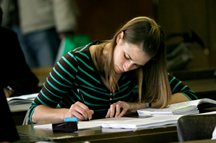It may be the height of the holiday season, but about a million people( in the U.K.) are about to get life-altering news. On Thursday, 300,000 school and college students will receive their A level results. A week later, another 700,000 will find out how they did in their GCSEs.And it is not just the students who have a lot riding on these high-stakes exams. For the schools they have attended and the teachers who work in them, poor results can mean bad headlines and professional damage.
But we are now finding out about the factors that make some schools more successful than others. New research carried out by the Economic and Social Research Council’s Teaching and Learning Research Programme (TLRP), and being sent to all schools in the UK at the start of next term, will help schools turn into places where students can become independent learners instead of being taught to pass tests and keep exam scores high.
Professor Mary James, deputy director of TLRP and an expert in school examinations and assessment, said: “The government says it wants to put less focus on targets when it assesses how well public services are doing. The work we have done shows that this new emphasis is the right one. A school where everything depends on paper results and performance does not develop children as learners. And teachers who are forced to work in this way cannot become more effective and responsible.”
Professor James had led a TLRP project on Learning How to Learn. It worked with 40 schools to see how pupil assessment can help people become more effective learners instead of being a barrier to success.
She says: “Our research showed that many teachers want to help pupils develop their own learning skills. There are big differences in how successfully different teachers manage to develop learners. But teachers who have proper professional development and support can help children to take responsibility for their own learning. These pupils can think about what they are learning and how, and, improving their own learning.”
The project is one of 22 described in the new TLRP booklet and DVD, Principles into Practice. All are aimed at improving learning in schools.
Further examples include:
- How can small children gain more from information technology? It turns out that giving them your old mobile might be more use than buying them a computer
- Children at school usually work on their own or in the whole class. TLRP research has shown that properly-run work in smaller groups can help learning.
- Changing schools can disturb children. But a structured exchange of knowledge between school and home, involving conversations, objects and pictures, can make it much easier and less disruptive.
- What do children really need to know about science? TLRP found out the key facts about modern science and developed successful teaching modules to get them across.
- Pupils have good ideas about their learning. But few schools have systems in place to make the most of their knowledge. TLRP showed how their achievement can be increased by better ways of listening to what they have to say.
Professor James said: “We have now carried out the UK’s biggest programme of research into improving schools education. Everything we are saying in Principles into Practice is based on solid evidence.”
Source: Economic & Social Research Council , Teaching and Learning Research Programme

